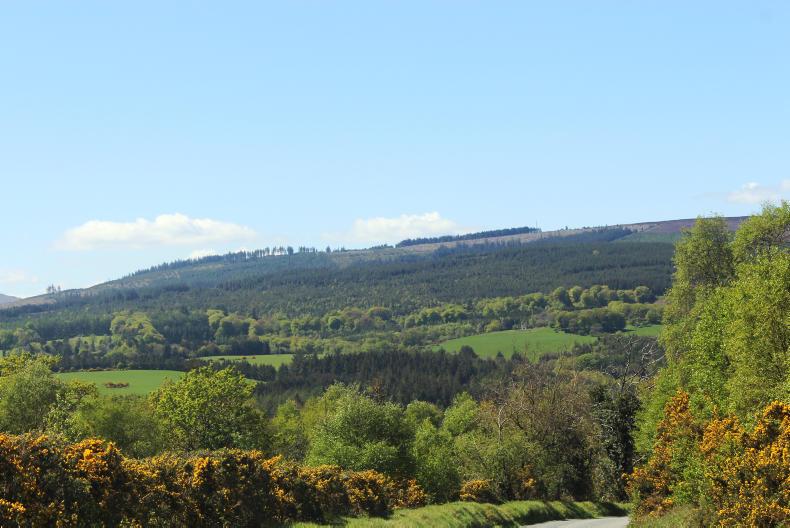So far, most companies in the forestry chain continue to work while observing Government Covid-19 guidelines. Nurseries and forestry companies are still functioning while nine out of 11 timber processing mills are in operation, albeit at reduced capacity.
Continuous production depends on licence approvals and viable domestic and UK markets as pointed out to the Irish Farmers Journal during our weekly roundup of the forestry and forest products sector.
Nurseries
The two major nurseries are still in operation. None-so-Hardy Nurseries is still producing plants at its two Co Wexford sites and storing plants at its Shillelagh, Co Wicklow, cold storage facility. “So far, we are distributing plants to afforestation sites which the guidelines allow,” said Teige Ryan.
Likewise, Coillte nursery production in Ballintemple, Co Carlow, is going ahead where “social distancing can be observed,” said Pat Neville, company communications manager. “We are also carrying out work such as reforestation.”
While Coillte has the advantage of supplying plants to a defined company reforestation programme, None-so-Hardy is supplying a far more uncertain afforestation market. The nursery cannot carry over planting stock “so it’s vital that increased afforestation licences are issued”, maintained Teige Ryan. “This would allow our 85-strong staff to continue working and avoid large numbers of surplus plants, which is why we support the call for emergency legislation to speed up planting licences.”
Forestry companies
Only one forestry company has shut down so far, although some are on reduced time. These are capable of providing the sector with a reduced planting programme. “The planting programme had decreased in any case due to the limited availability of afforestation licences,” said John O’Reilly, CEO, Green Belt.
As forestry companies are involved throughout the forest chain including afforestation, maintenance, roading and harvesting, “the speeding up of licences, especially at a time of crisis would have a major positive impact across all sections of the industry,” he maintained.
Contractors
Where work is available, contractors are operating as normal while observing Covid-19 guidelines. However, harvesting work has been slowing down since late last year due to insufficient felling licences. Michael Moroney, CEO of Farm & Forestry Contractors in Ireland (FCI), reiterated his call for emergency legislation to speed up licences.
“I have circulated 80 contractor companies on the FCI database outlining Covid-19 guidelines and telling members that they can continue work,” he said.
“Harvesting operations are proceeding in accordance with Department of Agriculture, Food and the Marine (DAFM) updates as raw material is required for pallets and wood energy which are essential products under the current guidelines.”
Timber processing
One board mill and one sawmill have ceased production. The remaining seven medium to large sawmills and two board mills are working but most have reduced output. “If your weekly intake is normally 10,000m3 of logs during peak production and your UK and Irish customers have ceased or significantly reduced intake, then you know you are on borrowed time,” said one sawmill spokesperson.
Sawmills producing pallet material for food and other products are working as normal, with demand likely to hold firm. The UK pallet and packaging market where most Irish product ends up is secure at the moment. This market received a boost two weeks ago when the UK government “recognised the importance of the [pallet] industry in keeping the supply chain going at this critical time”, according to Timcom, the UK timber packaging and pallet confederation.
The Irish and UK governments acknowledge that the pallet and packaging industry is vital in the provision of food, pharmaceuticals and medical equipment, so it follows that contractors and processors are classified as essential workers.
Traolach Layton, said that GP Wood has shifted operations to pallet wood production and has closed down the construction sawnwood line for now.
“The coronavirus crisis has temporarily masked the shortage of log supply from Coillte and private suppliers due to the shortage of felling licences,” he said. “But this will become a major issue when mills return to full production as continuity of log supply is essential for planning, job creation and customer confidence.”
Wood energy
The wood energy market, which is classed as an essential service, is holding up well “but supply of raw material (small logs and sawmill residue) is posing a problem,” said Noel Gavigan, Irish Bioenergy Association (IrBEA).
“Security of wood chip and pellet supply is vital for hospitals and nursing homes that have converted to renewable energy,” said Kenny McCauley, director McCauley Wood Fuels, the Mohill-based company.
“Wood biomass is also an essential energy source for companies that have made the transition to renewable wood energy including piggeries and poultry as well as mushroom and fruit producers,” he said.
He agreed with Noel Gavigan about raw material supply. “The availability of small logs has reduced due to decreased licences while a slowdown in sawmilling will reduce our supply of raw material, but we have sufficient stocks to last at least a couple of months,” he said.
The coronavirus outbreak is likely to slow down interest in the Support Scheme for Renewable Heat (SSRH), which was launched last May by Minister for Communications, Climate Action and Environment Richard Bruton. This scheme provides operational support for wood biomass boilers.
In addition to Covid-19 restrictions, the sharp decrease in oil prices has reduced the urgency of businesses to adopt the SSRH despite its cost saving potential and its importance in Ireland’s drive to reduce dependence on fossil-based fuels.






 This is a subscriber-only article
This is a subscriber-only article










SHARING OPTIONS: